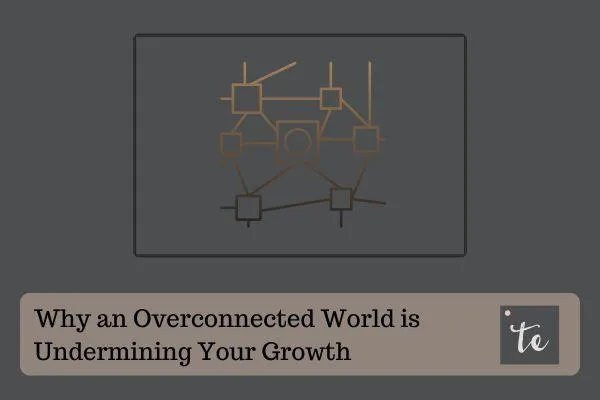
What Swimming Teaches Us About Team Relationships
In my latest video, I break down how swimming teaches us the importance of these relationship-building efforts and the specifics of what we as leaders need to nurture with our teams.
Holiday Gift Insights - What Everyone Else Is Doing
In an effort to simplify the decision-making process, we're sharing some of the trends we've seen with gifting over the years. We're even sharing our best seller and why that gift had such success.
What Makes A Successful Holiday Gift? The Travel Bag Edition
Last year we had the opportunity to work with one of our clients in the travel and tourism space to design an experience that delivered their highest engagement yet.

Why an Overconnected World is Undermining Your Growth
Despite being more digitally connected than ever, people are experiencing unprecedented levels of disconnection and loneliness.
Technology has revolutionized communication, enabling instant interactions across time zones. Yet, beneath the surface of this digital utopia lies a growing epidemic of loneliness and its ripple effects on both individuals and businesses.
For companies, this loneliness isn’t just a cultural concern—it’s a productivity and retention issue. From disengaged employees to longer sales cycles, the costs of disconnection are real and measurable. Let’s delve into why this matters and how leaders can create meaningful strategies to combat it.
The Growing Epidemic of Loneliness
The U.S. Surgeon General highlighted loneliness as a public health crisis in 2023, likening its health impact to smoking 15 cigarettes a day. But loneliness isn’t just a personal issue; it seeps into the workplace and customer relationships. A recent podcast episode from CNN’s Chasing Life reveals that loneliness stems not from a lack of people but from a lack of meaningful interaction. And as our society becomes increasingly digital, the depth of our relationships is shrinking.
Statistics reveal the scope of the problem:
31% of adults report being online "almost constantly".
Frequent interruptions from digital tools result in 23 minutes of recovery time per task.
50% of Americans experience loneliness, which directly impacts mental and emotional wellbeing.
These trends manifest in professional environments, too. Employees feel isolated in remote settings, clients grow weary of transactional interactions, and businesses struggle to foster loyalty in an age of convenience.
The Ripple Effects on Business Success
Loneliness and digital overload are quietly sabotaging the core pillars of business success:
Client Retention: Emotional disconnection drives clients away. A study shows that emotionally engaged clients are worth 52% more than those who are merely satisfied.
Employee Engagement: Employees who feel isolated underperform. Companies with highly engaged teams are 21% more profitable, yet remote or hybrid work models often leave employees feeling undervalued.
Productivity: Digital overload leads to task-switching fatigue. Frequent notifications and multitasking result in stress and reduced focus, costing businesses billions in lost productivity.
How Businesses Can Address Loneliness and Overload
Understanding the problem is only the first step. Here’s how businesses can take meaningful action to combat loneliness, improve retention, and enhance productivity:
1. Foster Emotional Connection with Clients
Personalized Touchpoints: Whether it’s a handwritten note or a thoughtfully curated gift, small actions make clients feel valued.
Genuine Care: Move beyond transactional emails to build real relationships. Acknowledge milestones and celebrate achievements with clients, showing them, you truly care.
2. Reimagine Team Dynamics
Encourage In-Person Interaction: While remote work is here to stay, periodic in-person meetups can rebuild the bonds that digital tools can’t replicate.
Celebrate Milestones: Recognizing employees’ achievements—both professional and personal—creates a culture of belonging.
3. Reduce Digital Overload
Set Boundaries: Encourage employees to set “offline hours” to recharge without constant pings and notifications.
Focus on Quality Communication: Train teams to prioritize meaningful conversations over endless email chains.
4. Create a Culture of Care
Companies must lead with empathy to cultivate lasting relationships:
Internal Engagement: Ensure employees feel valued through consistent check-ins and personal acknowledgments.
Client-Centric Mindset: Demonstrate understanding, validation, and care in every interaction, aligning with the principles of Harry T. Reis’s relationship science.
Addressing loneliness and digital overload requires more than isolated efforts—it demands an intentional culture that prioritizes connection and care. A business culture rooted in empathy becomes the foundation for deeper relationships, enabling employees and clients to feel valued and supported. When organizations actively demonstrate understanding, validation, and care, they foster environments where trust thrives and engagement increases. By integrating these principles into daily operations, companies can counteract the isolating effects of a digital-first world and build a solid framework for long-term success.
Reflect and Rebuild: 5 Key Questions for Leaders
To implement these strategies effectively, business leaders must ask themselves:
Am I prioritizing meaningful relationships over short-term gains? Build loyalty by investing in emotional connections rather than focusing solely on transactions.
Do I have a system for personalized engagement with clients and employees? Consistency is key to showing you care.
How well do I understand the needs and challenges of my team and clients? Active listening and empathy are crucial to building trust.
What steps can I take to reduce digital overload in my organization? Encourage mindful use of technology to enhance productivity and wellbeing.
Does my company culture reflect a commitment to care and human connection? A culture of empathy will naturally extend to clients and partners, creating a ripple effect of positive engagement.
The Future of Connection in Business
As we navigate the challenges of a digital-first world, businesses that prioritize relationships will stand out. By addressing loneliness and fostering meaningful connections, companies can drive loyalty, enhance productivity, and contribute to societal wellbeing.
At The Expressory, we specialize in helping businesses create lasting emotional connections through strategic engagement. Whether you need to revamp your client retention strategy or build a culture of care within your team, we’re here to help. Schedule a conversation or join one of our community Q&A sessions to learn more.
Address:
1500 S. Sylvania Ave #106
Sturtevant WI 53177
Phone:
414.243.8971

